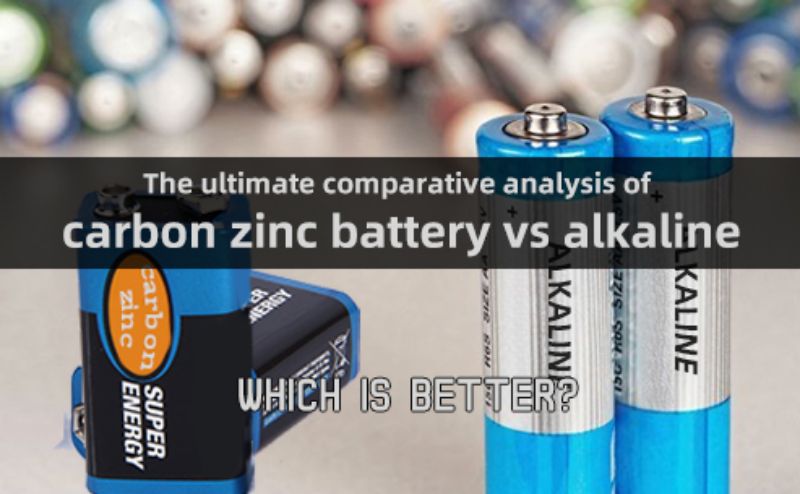
Main content:
- What are carbon zinc batteries, and what are their uses?
- Are carbon zinc batteries rechargeable?
- Are carbon zinc batteries the same as alkaline batteries?
- Do carbon zinc batteries last longer than alkaline batteries?
- Using carbon zinc batteries instead of alkaline batteries
- Benefits of using alkaline batteries over carbon zinc
- Are carbon zinc batteries the same as lithium batteries?
- Are alkaline batteries better than lithium batteries?
- In summary
Which is better when it comes to carbon zinc battery vs alkaline - a common question many ask themselves before settling for one. It is important to select the ideal battery for daily applications in low drain applications, such as TV remote batteries, as it will save you money and time. This article is designed to help you understand the following concepts:
- What a carbon-zinc battery is and how it functions?
- What an alkaline battery is as well as how it functions?
- The key differences between these two battery types.
- How to care for these two battery types well?
Let’s get started!
1.What are carbon zinc batteries, and what are their uses?
First things first - before diving deep into the application of carbon-zinc batteries, it would be best first to understand what carbon-zinc batteries are - the basics of carbon-zinc batteries. Carbon zinc batteries (aka zinc-carbon batteries) are dry cells that provide direct electric current to devices. Most carbon-zinc batteries are used to power small devices on a long-term basis. Such devices include remote controls, clocks, fire sensors, torches, etc. It would be best to check on these batteries periodically - they leak over time as their charge gets depleted. Carbon zinc batteries start to leak because zinc degrades over time. Now, you are probably thinking to yourself: “Is it possible to recharge my carbon zinc batteries?”
|
Attribute |
Carbon-zinc battery |
Alkaline battery |
Lithium battery |
|
Electrolyte |
Ammonium chloride |
Potassium hydroxide |
Lipf6, Libf4, or Liclo4 |
|
Voltage |
1.55V to 1.7V |
1.5V |
3.7V |
|
Energy density |
55 Wh/kg to 75 Wh/kg |
45-120wh/kg |
250-450 Wh/kg |
|
Lifespan |
18 months |
3 years |
10 years |
|
Safety |
Leaks electrolytes over time |
Lesser risk of leaking electrolyte compared to carbon-zinc |
Safer than both carbon-zinc and alkaline batteries |
|
Applications |
It is used to power low-power devices such as remote controls, toy cars, etc. |
It is used to power devices long-term, for example, cameras, MP3 players, etc. |
Energy storage lithium battery can be used for home energy storage, commercial energy storage and industrial energy storage; Power lithium batteries can drive some equipment or tools that require large energy, such as golf cart batteries, RV batteries, etc. |
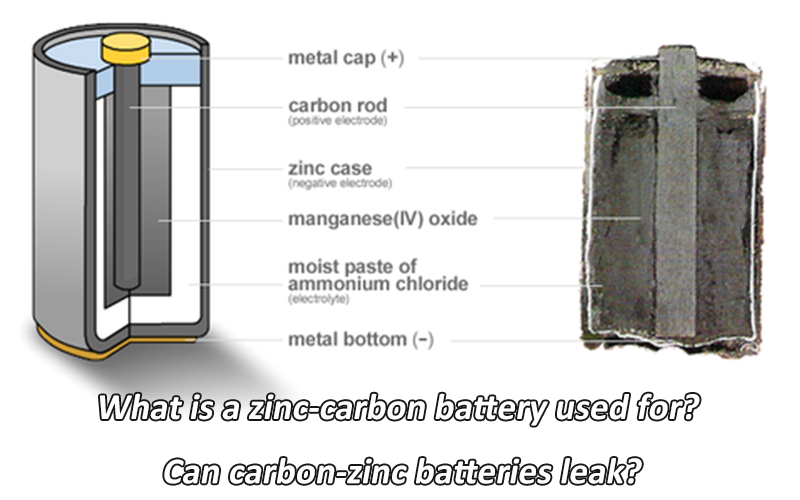
2.Are carbon zinc batteries rechargeable?
No. Carbon zinc batteries are not rechargeable. Once their charge is depleted, it would be best for you to dispose of them safely by following the regulations set by your local authority on disposing of waste batteries. Charging carbon-zinc batteries will certainly cause an explosion which might start a fire, damage property, or even cause loss of lives.
3.Are carbon zinc batteries the same as alkaline batteries?
Not entirely - the primary difference between them is the type of electrolyte used. Carbon zinc batteries use zinc chloride electrolytes, while alkaline batteries use potassium hydroxide. Carbon zinc batteries are used to power low-power devices on a short-term basis, while alkaline batteries are used to power devices on a long-term basis. Also, carbon-zinc batteries have a shorter life compared to alkaline batteries.
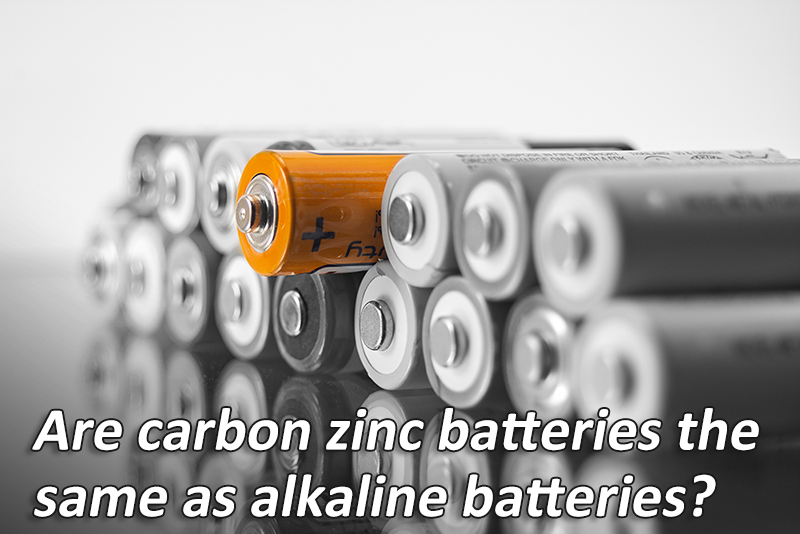
4.Do carbon zinc batteries last longer than alkaline batteries?
Carbon zinc batteries, also known as zinc chloride batteries, are widely used in low-drain devices such as remote controls, clocks, and flashlights. In terms of shelf life, carbon zinc batteries can last up to 18 months under optimal storage conditions. However, these batteries are non-rechargeable, meaning they have no cycle count—once depleted, they must be replaced. Their main advantage lies in their low upfront cost, making them suitable for devices that consume very little energy intermittently.
On the other hand, alkaline batteries generally have a longer shelf life, with a maximum of up to 3 years when stored properly. While commonly perceived as single-use, alkaline batteries can actually be partially recharged, a process known as regeneration. It is important to note that this is not the same as the standard charging process of rechargeable batteries such as NiMH or Li-ion cells. Under controlled conditions—charging at rates below 0.1C—alkaline batteries can be regenerated up to 20 times, but this is only possible from a partial discharge. Alkaline batteries cannot be fully recharged from a deep discharge, which limits their practical rechargeability and makes regeneration generally uneconomical.
Cost and Practical Lifespan Comparison
When evaluating cost-effectiveness, the picture becomes clearer. Carbon zinc batteries are cheaper per unit, but due to their shorter lifespan, they need to be replaced more frequently. For example, in a low-drain device that runs continuously, a carbon zinc battery might need 2–3 replacements per year, whereas an alkaline battery could last the entire year—or even longer—without replacement.
Considering both initial cost and replacement frequency, alkaline batteries often provide better overall value. Even if a single alkaline battery costs 1.5–2 times more than a carbon zinc battery, the longer lifespan and higher energy output mean fewer replacements over time, saving money in the long run. For users who prioritize longevity and fewer battery changes, alkaline batteries are generally the more economical choice.
5.Using carbon zinc batteries instead of alkaline batteries
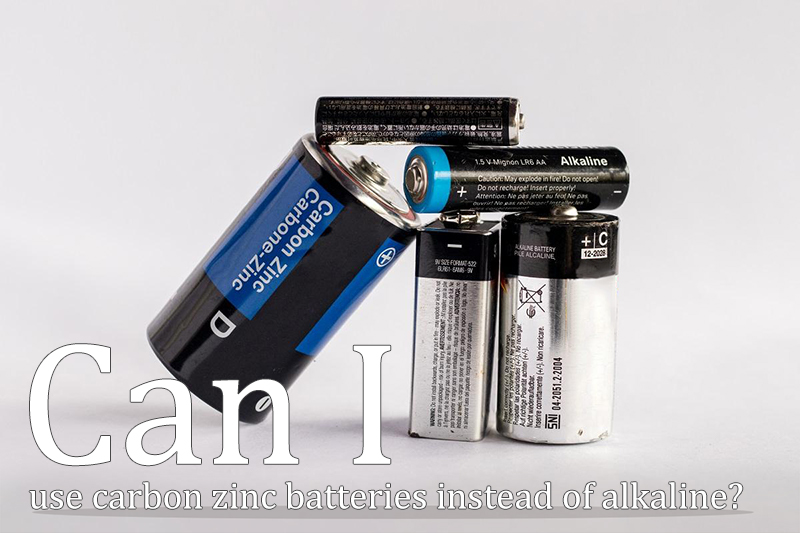
While it is possible to use carbon-zinc batteries instead of alkaline batteries, doing so is not recommended. Alkaline batteries have a higher energy density compared to carbon-zinc batteries. In addition to that, alkaline batteries last longer than carbon-zinc batteries. It would be best to consider using lithium batteries in places of carbon-zinc and alkaline batteries as they are rechargeable batteries that have longer life and are more environmentally friendly.
6.Benefits of using alkaline batteries over carbon zinc
There are several benefits associated with using alkaline batteries over carbon-zinc batteries. Check them out:
- Carbon zinc battery vs. alkaline: Energy density - Alkaline batteries have a higher energy density than carbon-zinc batteries.When it comes to energy density, the energy density of lithium-ion batteries is undoubtedly the highest, much higher than the previous two.
- Carbon zinc battery vs. alkaline: Longer lifespan - Alkaline batteries have a longer lifespan (of about 3 years), while carbon-zinc batteries can only last for around 18 months.On the other hand, lithium-ion batteries have a longer life and can be cycled 4000 times on the premise of one charge and discharge per day on average, that is, 10 years (4000/365≈10.96).
Carbon zinc vs. alkaline: Lower risk of electrolyte leakage - Alkaline batteries have a lower risk of leaking electrolytes than carbon zinc. Remember, carbon-zinc batteries will start leaking electrolytes as zinc degrades gradually. It should be noted that there is no risk of leakage from gel and solid-state lithium batteries.
7.Are carbon zinc batteries the same as lithium batteries?
No. Carbon zinc batteries are not the same as lithium batteries. The performance of carbon-zinc batteries is far less than that of lithium batteries. They have a lower energy density and are primarily used to power devices such as remote controls (devices that require low power to run). It, therefore, goes without saying that zinc batteries are not better than lithium batteries.
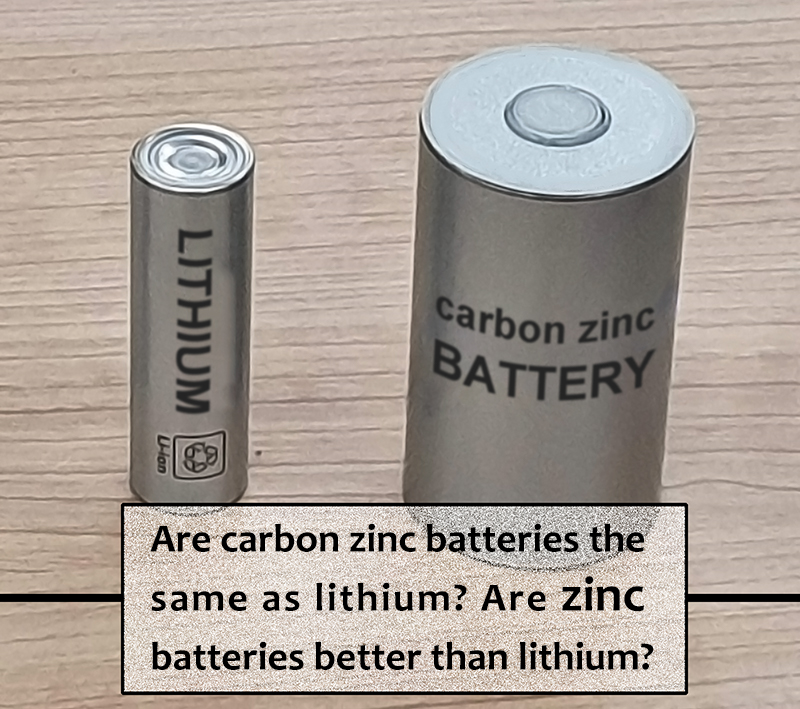
8.Are alkaline batteries better than lithium batteries?
Lithium batteries are way better compared to alkaline batteries. How so? First, lithium batteries have a higher energy density than alkaline batteries, meaning they are smaller, lighter, and stronger. Alkaline batteries have a nominal voltage of 1.5V per cell, while lithium batteries (ternary lithium battery) have a nominal voltage of 3.7V per cell. Lithium batteries have wider operating temperature range and perform better than alkaline batteries in hot and cold environmental conditions. In addition, lithium batteries are more environmentally friendly than alkaline batteries.
9.In summary
In the comparison of carbon zinc battery vs alkaline - carbon-zinc batteries are seems cheaper than alkaline and lithium batteries. Alkaline batteries are by far better than carbon-zinc batteries. However, lithium batteries have a longer service life than both carbon-zinc and alkaline batteries, and their performance is better than the other two, so their average daily cost is lower and more cost-effective.Alkaline batteries are used to power devices long-term, unlike carbon-zinc batteries, which are primarily used to power low-power devices. Consider the following table:
Alkaline batteries are way better than carbon-zinc batteries. While carbon-zinc and alkaline batteries get the job done, using lithium batteries is more beneficial. It is safer, has a higher energy density, and will last longer than carbon-zinc and alkaline batteries.
Related article: solid state batteries vs lithium ion, AGM battery vs lead acid
















